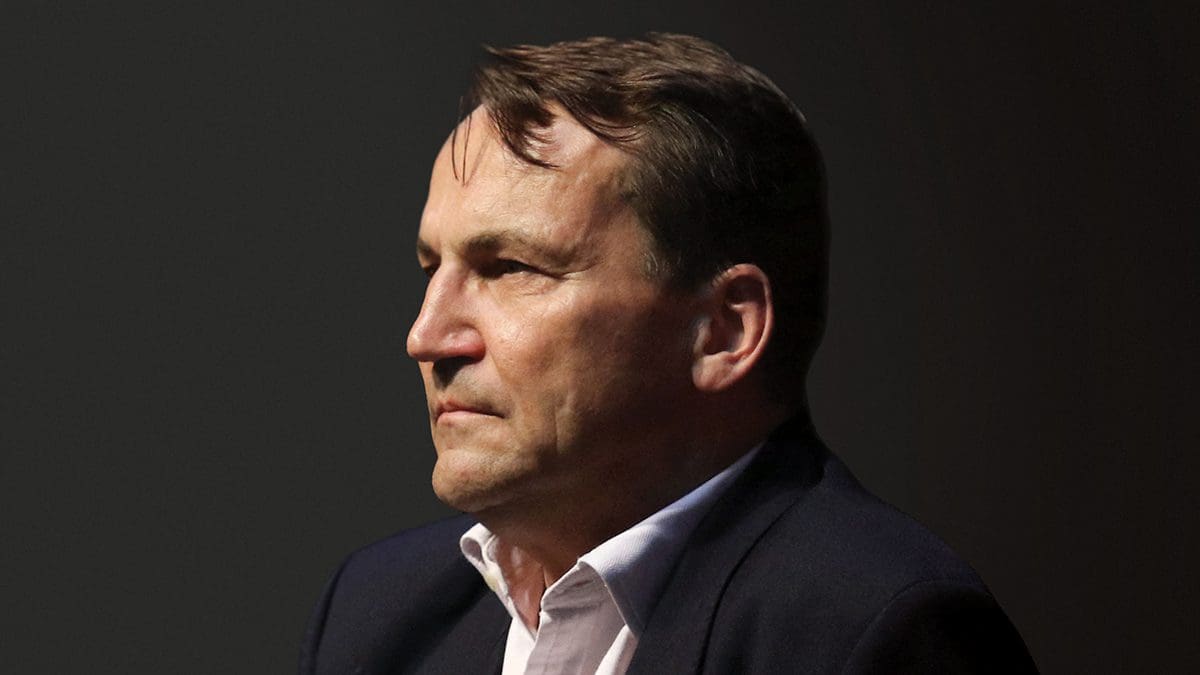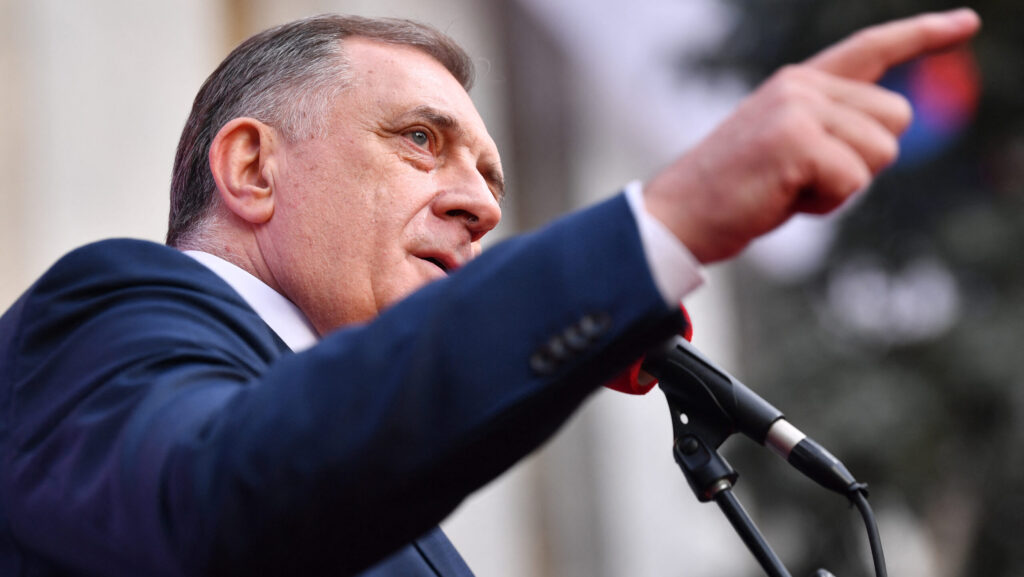Ukraine is now the advance guard of Western civilization, as Poland and Hungary used to be – says Former Polish Foreign Minister Radosław Sikorski. In an interview with Hungarian weekly Mandiner Mr Sikorski talked about sanctions, the outcome of the war and Viktor Orbán. The Polish politician, People’s Party MEP in the European Parliament, was in Hungary as a guest of Mathias Corvinus Collegium.
It is not very often that we have the opportunity to chat with a member of the Bilderberg Group. How was the meeting?
I’m not just a member, I’m a member of the management committee. But of course, you know, I can’t tell you anything or I’ll be shot.
Okay. As Poland’s foreign minister, you orchestrated a kind of Polish-Russian rapprochement, and got the Russians to lift their sanctions on Polish agricultural products. You were also the foreign minister during the Smolensk air disaster in which President Lech Kaczyński was killed. In your view, was that tragedy the turning point in Polish-Russian relations?
That accident happened because the pilots were flying too low. A terrible case, I knew four fifths of the people on board. But you’re right: Putin did not immediately become Putin. When Washington reset its relations with Moscow, we also tried to encourage the Russians to take a path parallel to or closer to Western values. There were promising signs for a while. Vladimir Putin, for example, was the first leader of Russia to go to Katyn. That is no small thing, considering that Russia had lied about their crimes committed there for fifty years! In 2009, Putin came to Gdańsk with other European leaders on the anniversary of the outbreak of WWII, admitting that the Second World War began with the invasion of Poland – in contrast to the Stalinist narrative, which insisted that the war broke out when the Germans attacked the Soviet Union. That was quite something!
Then there was the so-called group of difficult cases that included agreeing on historical facts, which was also successful. For to be reconciled, you must tell the truth. The Polish leader of the group of historians said to me: ‘Mr. Minister, if we erased the names of the authors of the historical essays, we wouldn’t be able to tell which were written by Poles and which by Russians.’ Wow! But now their terrible imperialist, Stalinist, tsarist propaganda machine is roaring… Then there was the first visit of the Moscow patriarch to Poland. We urged the Polish and German churches to do what the German bishops did in the 1960s, that is, forgive and ask for forgiveness. This was considered a great achievement at the time. An agreement was also reached on border traffic in the Kaliningrad exclave, which allowed approximately one million Russians to enter some areas of Poland, including Gdańsk, and Poles to go to Kaliningrad. This was useful because Russians started buying apartments in Gdańsk and Kaliningrad became the most anti-Putin part of Russia. I think that Putin has always had this vindictive, neo-imperial streak, but he only definitively turned away from the West in the winter of 2011, when there were protests in Moscow and St. Petersburg against his return to the presidency, and he blamed the United States for these protests. He said to himself, ‘you wanted to oust me with a coup, I will never forgive that!’
Now their terrible imperialist, Stalinist, tsarist propaganda machine is roaring
Please help me understand the Polish standpoint, which is not only that of the government but is shared by the whole political establishment, namely that if Ukraine cannot resist the Russian invasion, Poland will be next. However, if anyone looks at the map today, they can see that Russia is currently struggling even to reach its minimum goal in the Donbass…
Yes, I know this now, and you also, but we didn’t know it five months ago. We thought Putin had a first class army, and he thought so, too.
Fair enough, but Warsaw is still convinced that the Baltics and Poland will be the next targets. Seeing how the Russian military is performing, what makes you in Poland still say that?
Because Putin is a recidivist criminal. He attacked Georgia, attacked Donbas, and if the Anschluss of Ukraine had succeeded, he would have occupied Kyiv as well – that was the plan, and then he would be right here, at the Polish border. You are too young to know, but a long time ago we had a joke about the Soviet Union–and the Russians are still talking about its revival today–which goes like this: what is a safe border of the Soviet Union?
The Berlin Wall?
A safe border of the USSR is one with Soviet soldiers on both sides. You have learned this to your own detriment in 1956, and we don’t want to go back there.
Poland has always been strongly pro-sanctions. Although the punitive measures have serious long-term effects on the Russian economy, they have little effect on the ongoing war. Moreover, you could see how the sanctions radicalized the Belarusian regime. Why do they still think that this is the right solution?
As for the facts: our Crimea sanctions have made it difficult for Putin to modernize his military with dual-use technologies or chips. Ukrainians found chips used for washing machines in Russian weapons. That’s because the Russians can’t buy our chips, and without chips you cannot make precision firearms. In this regard, sanctions do work to some extent. I agree that we should have been much tougher earlier. Russian opposition leader Alexei Navalny has a list of 6000 people, enablers of the regime who support this war and who have committed major corruption crimes. These people should be on our sanctions list! We should have banned RT and Sputnik for spreading their harmful propaganda and imperialist ideology much earlier, and so on. But if you look at the history of sanctions against South Africa, Iran, North Korea, or any other country, you can see that they never exert an effect immediately, and that there is no sanction that does not harm to the country that imposed it. But the punitive measures are important to make it increasingly difficult for Putin to feed his war machine, so that he cannot build a twenty-first century military.
The energy sanctions, which have unequivocal support in Poland and the European Union, will lead to a loss of our competitive advantage over the United States. Aren’t you concerned that this sanctions regime will weaken Europe and thus serve US interests?
Obviously, we will have costs. Some countries have become overly dependent on Russian gas. German Chancellor Angela Merkel had simultaneously approved Nord Stream, sold German gas storage facilities to Gazprom and closed Germany’s nuclear power plants. We warned them not to do so, but they went ahead anyway – now they are paying the price. Our economies will suffer some damage–we politicians, we have to be honest about that–but the question is whether we would rather turn the heating down by a notch or two at home, or have Putin and his totalitarian country dominate a nation of forty-five million on our doorstep. Freedom does not come free. To disengage from Russia and find more reliable suppliers, that will take time. By the way, I’m all for buying not just our gas jointly–and not just from Russia!–but our uranium, too. That way we can get secure supplies at competitive prices. But the price of a triumphant Putin annexing Ukraine would be much higher, not just economically, but in every other respect.
You recently wrote on Twitter, ‘I assume that Orban has reached an agreement with Putin on the partition of Ukraine.’ As a politician with considerable foreign affairs experience, how could you fall for a conspiracy theory that bears an uncanny resemblance to Russian propaganda about the Polish annexation of Western Ukraine?
The head of the Ukrainian Security Council, who made this allegation, echoed the suspicions of many. We know that Hungary was traumatised by the Treaty of Trianon, and we have heard Viktor Orbán say that Hungary is the only country in Europe that borders with itself. We wonder why an old anti-Soviet liberal has a soft spot for Putin. And we fear that something that is taboo in Poland, the changing of European borders, might be welcomed by some Hungarians.
Do you seriously see a legal framework for an EU and NATO member state to find a way to legally annex part of Ukraine?
Look, let’s not go that far. Your Prime Minister says it’s not true and it certainly didn’t happen. Maybe it would only have happened if Putin had won according to his original scenario, but failed… Let’s not forget that Hungary had tried to change its post-Trianon borders during WWII, and that was not successful either. And if you support a losing aggressor, it will have consequences.
Let’s take a look at Polish domestic politics, because you have an election coming up. What are the prospects for the Civic Coalition alliance, what chance do you see of winning the election, and forming a new government?
The Polish government has been one of the worst in dealing with the pandemic
Two weeks ago, a well-known pollster had a survey that put us ahead of the incumbent Law and Justice party. Since the return of Donald Tusk to the domestic political scene, we have doubled our support. The Polish government has been one of the worst in dealing with the pandemic. We had an enormous, two hundred thousand excess deaths during the epidemic and one of the highest inflation rates in Europe. There is also a widespread perception that the government is corrupt. The public media is used as a mouthpiece for party propaganda, there are merciless attacks on the opposition, including Pegasus, and journalists are bribed with public money…The simplest definition of democracy is a system where the government can lose, but the ruling parties are trying to create a system where it is difficult for the government to lose. But, as I said, we are gaining ground and I hope the voters will pronounce a stern verdict.
Finally, what do you think is the realistic–and I underline realistic–outcome of the war in Ukraine?
Putin’s forces must be defeated in Ukraine and they have to retreat to Russia.
Do you see that as realistic?
In the last two weeks alone, the Ukrainians have destroyed hundreds of Russian ammunition depots and command posts. The Russians have lost the battle of Kyiv, the battle of Kharkiv, they have gained a third of the Donbass at a huge loss of men and material, and their position in Kherson is very precarious. I think the reports about the low morale of the Russian soldiers may be true, but the Ukrainians are fighting for their freedom. A lot will depend on what we do in the free world – whether, as Poland, the United States, Estonia, Sweden, Finland have done, we help the Ukrainians to defend their land from filtration camps, from deportations, from Russian annexation. There is a chance that Putin will understand this, sooner or later, as Stalin understood the consequences of invading Finland. If we don’t help, there will be a pause, then Putin will regroup, rearm, and move on. Just as Poland and Hungary in the past, Ukraine is now the advance guard of Western civilisation.
Click here to read the original article








